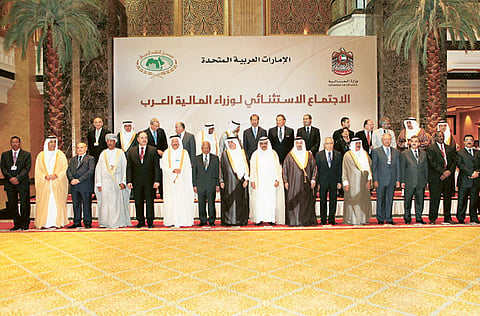Stronger inter-Arab ties sought
Arab ministers' meeting discusses regulations, transparency and IMF Report

Abu Dhabi: The UAE's approach to economic policy is based on five main pillars that support the financial and economic stability of the Arab world, Obaid Humaid Al Tayer, UAE Minister of State for Financial Affairs, said yesterday.
Addressing a press conference after the meeting of Arab finance ministers, Al Tayer said: "These pillars include financial and economic stability in the Arab world, creating job openings, stability of prices of goods, Arab food security, trade financing and Arab electronic clearance, which will help boost inter- and intra-regional trade."
Regional financial status
Al Tayer said that the ministers did not discuss financing any Arab country, but "the IMF report about the global and regional financial status".
"We also discussed the report by the OECD [Organisation of Economic Cooperation and Development] with regard to transparency and tax regulations," added Al Tayer, saying the ministers listened to UAE proposals on upgrading Arab financial policies.
Following the Abu Dhabi meeting, the Arab Monetary Fund plans to send a letter to the IMF and the World Bank on the views of the Arab finance ministers.
Although the US debt issue and the EU's fiscal woes have no direct impact on the region, if oil prices drop, this will negatively affect the performance of Arab economies, said Al Tayer. He said that the ministers had also discussed how Arabs would benefit from their competitive advantages in some sectors.
"We discussed this matter and how we can make use of our competitive advantages in sectors such as banking and financial services that will benefit the whole Arab world," Al Tayer said.
In the meeting yesterday, leaders discussed reform of the global economic and financial systems. Ministers discussed the issue as it relates to the Arab world and Abu Dhabi's initiative for restructuring Arab economies. The gathering also delved into strategies to deal with the effects of the global economic crisis and the political and social changes witnessed by Arab states recently.
"Through hosting this meeting, the UAE aimed to enhance the presence of Arab states in important international meetings and events. [This is] in addition to developing the vital role of prominent Arab financial and economic institutions in restructuring Arab economies and strengthening inter-Arab economic ties; among other issues such as food security," said Al Tayer.
The ministerial gathering also discussed mechanisms to coordinate tax policies between Arab states to strengthen regional integration. It also looked at the necessary support mechanisms to ensure the enhancement of inter-Arab trade activities and the development of Arab financial policies.
Increased cooperation
Speakers called for increased economic cooperation and integration among Arab countries. "The meeting in Abu Dhabi highlights the prominent position held by the UAE and the ministry of finance [in the region], and acts as a platform to further follow up on various social and development issues that pertain to Arab states," said Al Tayer.
As for Libyan assets in the UAE, he said that these cannot be unfrozen without a UN Security Council Resolution that asks the country to do so.



